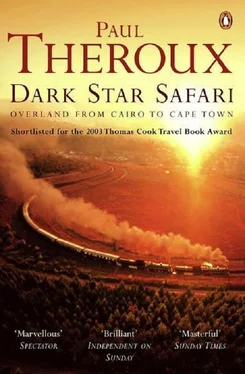Mohammed said, ‘You give me money. I show you moomiya. You touch!’
‘Please stop saying money.’
He laughed, he gabbled, I was not listening, I didn’t really care, I was laughing myself. I felt a great happiness — the horse, the light, the decay, the ancient shapes, the children’s laughter — and it became one of the epiphanies of my traveling life.
I dismounted and leading my horse closer to the Sphinx I was approached by a woman who asked, using gestures, if I would help her lift a heavy plastic basket. I heaved it — but it was heavy, perhaps forty pounds — Mohammed was laughing at me from where he sat on his horse — and she curtsied while I placed the big basket on to her noggin. She could not hoist it alone but she easily carried it on her head.
Riding back to the stables, Mohammed began shouting ahead of me, louder than before.
‘Look! Look! See that man!’
The man was standing by a wall, a young man in a white robe, a tangle of turban on his head.
‘He not from Egypt! He from Sudan! I know, I know — because his face! He from there.’
Mohammed waved his arm, indicating far away — southerly, in a Sudanese direction.
‘Black!’ he howled, for blackness was such a novelty in Lower Egypt; and he galloped onward. ‘Black!’
Traveling south of Egypt I would be entering the Sudan. I did not have a Sudanese visa and for Americans such visas were hard to come by. The reason was understandable. On the pretext that Sudan was making anti-American bombs (and some people felt to correct the negative image created by the Monica Lewinsky scandal, to look decisive and presidential, even if it meant risking lives and flattening foreign real estate), President Clinton ordered air strikes against the Sudan. He succeeded in destroying a pharmaceutical factory outside of Khartoum in August 1998. This bomb crater would be on my itinerary, for after the bombs were dropped no one in the United States took much interest. Though we become hysterical at the thought that someone might bomb us, bombs that we explode elsewhere, in little countries far away, are just theater, of little consequence, another public performance of our White House, the event factory.
‘I would like to see the bomb site,’ I was telling the Sudanese ambassador, Salih Mashamoun, in his office in Cairo. He was a pleasant, well-educated man who had been ambassador to Vietnam. He was Nubian, he said, from northern Sudan, and raised speaking Nubian.
‘Is Nubian anything like Arabic?’
‘Nubian has no connection with Arabic. It is the true pharaonic tongue.’
He said that he regarded Nubians as the genuine Egyptians and that colonialists had confused the issue by imposing a frontier that divided Egypt and the Sudan. Talking with him made me want to go to Nubia.
‘There, inshallah , you will find pyramids and ruins that are greater than Egyptian. Nubia is the source of Egyptian culture. You must see Dongola and Meroe. The upper Nile. The Nubian tombs.’
But first I needed a visa. I made repeated visits to the Sudanese Embassy. The doorman got to know me, and after three visits he simply waved me through the gate and I went unaccompanied upstairs to the ambassador’s office, and when I put my head through the door he beckoned me in and urged me to sit and talk and offered me tea and told me that Khartoum had not responded to my visa application.
‘But perhaps, inshallah , it will be given.’
‘What shall I do?’
‘You can reapply. Or see Mr Qurashi. He is consul.’
Mr Qurashi Saleh Ahmed was thin, smirking, officious, always waving a cigarette, with a male secretary who constantly shouted at him. Mr Qurashi blew smoke at him and did not respond.
‘No fax from Khartoum.’
‘Maybe it will come tomorrow.’
‘ Inshallah .’
It was helpful at this early stage of my trip to be reminded of the conflicting meanings of inshallah , which are: ‘We hope’ and ‘Don’t count on it.’
Mr Qurashi said, ‘You can reapply.’
Inaction from an official in such circumstances inspires the thought: Does he want baksheesh? I hung around, wondering whether to offer a bribe, and how to phrase the offer.
I took Mr Qurashi aside and said, ‘Is there anything I might do to help this matter along?’
He said nothing, he happened to be reading a closely typed letter.
‘Perhaps I could pay in advance?’
He was not tempted, he accepted my new application, he urged me to pay another visit because phones were unreliable. ‘But they will be repaired, inshallah.’
I went the next day, and the day after. The same taxi driver, Guda (‘like same as Dutch cheese’, I got the joke every day), who said, ‘In my whole life, I have never taken an American to this embassy. And why you want to go to Sudan?’
‘To see the pyramids. To talk to the people.’
‘Leetle birameed! Boor beeble!’
There is no ‘p’ in Arabic, no ‘v’ either.
More visits followed, I wanted to give this visa my best shot; but in a narrative of this kind such stories of delays are not interesting. The traveler awaiting a visa sits in a stinking armchair in the embassy foyer, looking at the national map and the colored photographs of the national sights and the dusty national calendar, the framed picture of the head of state smiling insincerely, the unfamiliar national flag; cranky officials, the sounds of telephones and murmurs, the back and forth of harassed secretaries. It is easy in these circumstances to talk yourself out of going, for this awful building and this dreary room begin to seem like the country itself.
To pass the time in this week of waiting, I went to the Cairo Museum, I visited the Nobel Prize-winner, Naguib Mahfouz, whom I had last seen in the Intensive Care Ward of the Military Hospital after his stabbing by a Muslim fanatic (recently hanged); I went to a party, I got other, easier visas.
Images of the African interior, where I was headed, filled the Cairo Museum, and I consoled myselfby strolling up and down the enormous rooms and the ornate displays, looking at the Africa of wild animals and majestic palms and sculptural faces with the heavy-lidded Nubian gaze, vividly displayed in ancient carvings and paintings and bas-reliefs and sculptures in the museum. Representations in gold and ebony and precious stones of lions, cheetahs, cobras, eagles, hippos were everywhere, not as incidental decorations but as idols, the cobra god Wadjet, the bat-eared jackal Anubis, god of mummification, the sly sexual lion-headed goddess Sekhmet, lion-bodied men, alabaster cats, huge gold hawks, and even the chariots and the gold beds were given an African theme in the vivid imagery of posts with the features of hippos and rails in the shapes of leopards.
Small blue-glazed hippos, King Tut’s cheetah-skin shield, the multitude of stone-carved upright cats — all of them feline gods. To me this was an African treasure house, with fantastic mummifications, the mummified falcon, Horus, mummified sacred ibis; fish in mummy wrappings, and a crocodile in cloth, too, for crocs were worshiped up the Nile in Kom-Ombo, where I wanted to go. The Goddess of Joy, Bastet the cat, mummified as a slender gauzy idol. The Egyptian sentiment and craze for preservation had them mummifying their pets, their trophies, their prize catches, much as a moose hunter seeks a taxidermist and just as frivolous — a mummified Nile perch five feet long, a mummified dog with its tail jerked vertical, the skeleton of a horse.
I was reminded of how from medieval times mummies were taken to Europe for use in medicine (Montaigne mentions this in his essay ‘On the Cannibals’) and that Othello’s handkerchief, woven by an Egyptian, had magic properties, for it was ‘dyed in mummy.’
Читать дальше












